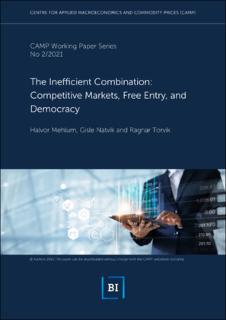The Inefficient Combination: Competitive Markets, Free Entry, and Democracy
Working paper
Permanent lenke
https://hdl.handle.net/11250/2725468Utgivelsesdato
2021-01-27Metadata
Vis full innførselSamlinger
Sammendrag
We show that under fairly general conditions, the combination of (i) competitive markets, (ii) free entry, and (iii) democracy is inconsistent with allocative efficiency. This fundamental impossibility result, which has not been derived before, holds whenever not only prices, but also policy, responds to factor allocations. We develop a theory where agents enter an occupation (more generally, enter an economic activity) and thereafter make a policy decision. Thus, each voter's self interest becomes endogenous to the entry decision. In our baseline model, the policy instrument that citizens decide upon is simply taxation. Workers in occupations whose services are in high demand by the government have an incentive to vote for high taxes. Voters in occupations whose services are in low demand by the government have an incentive to vote for low taxes. We show that the socially efficient size of the public sector cannot be sustained in equilibrium, despite free entry into occupations. We generalize our theory, and show how our impossibility result extends well beyond the baseline model. We also discuss how departing from competitive markets may affect equilibrium outcomes. Our analysis implies that when assessing causes and consequences of factor allocations, it is key to acknowledge how allocations affect not only prices, but also policies.
